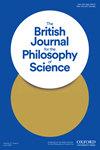Unpacking Black Hole Complementarity
IF 2.3
1区 哲学
Q1 HISTORY & PHILOSOPHY OF SCIENCE
引用次数: 0
Abstract
To what extent does the black hole information paradox lead to violations of quantum mechanics? I explain how black hole complementarity provides a framework to articulate how quantum characterizations of black holes can remain consistent despite the information paradox. I point out that there are two ways to cash out the notion of consistency in play here: an operational notion and a descriptive notion. These two ways of thinking about consistency lead to (at least) two principles of black hole complementarity: an operational principle and a descriptive principle. Our background philosophy of science regarding realism/instrumentalism might initially lead us to prefer one principle over the other. However, the recent physics literature, which applies tools from quantum information theory and quantum computational complexity theory to various thought experiments involving quantum systems in or around black holes, implies that the operational principle is successful where the descriptive principle is not. This then lets us see that for operationalists the black hole information paradox might no longer be pressing.打开黑洞互补
本文章由计算机程序翻译,如有差异,请以英文原文为准。
求助全文
约1分钟内获得全文
求助全文
来源期刊

British Journal for the Philosophy of Science
管理科学-科学史与科学哲学
CiteScore
6.00
自引率
0.00%
发文量
50
审稿时长
>12 weeks
期刊介绍:
The British Journal for the Philosophy of Science encourages the application of philosophical techniques to issues raised by the natural and human sciences. These include general questions of scientific knowledge and objectivity, as well as more particular problems arising within specific disciplines.
Topics currently being discussed in the journal include: causation, the logic of natural selection, the interpretation of quantum mechanics, the direction of time, probability, confirmation, foundations of mathematics, supertasks and the theory of emotion.
 求助内容:
求助内容: 应助结果提醒方式:
应助结果提醒方式:


